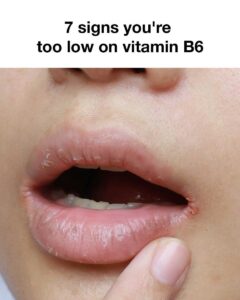
7 Signs You’re Too Low on Vitamin B6
Vitamin B6, also known as pyridoxine, is a water-soluble vitamin essential for various bodily functions, including neurotransmitter production, protein metabolism, and immune system support. While most people get enough B6 through their diet, deficiencies can occur, particularly in those with certain medical conditions, dietary restrictions, or poor nutrient absorption. Recognizing the signs of a B6 deficiency is crucial for addressing it promptly.
Why Vitamin B6 Is Essential
Vitamin B6 plays a role in several critical processes, such as:
- Brain Function: It helps produce neurotransmitters like serotonin and dopamine.
- Hemoglobin Production: B6 is vital for forming red blood cells and preventing anemia.
- Immune Health: It supports the immune system by aiding in the production of antibodies.
- Protein Metabolism: It helps the body break down proteins into amino acids for energy and repair.
The 7 Signs of Vitamin B6 Deficiency
1. Unexplained Fatigue
Feeling constantly tired despite adequate rest can indicate a B6 deficiency. B6 is crucial for converting food into energy, and without enough, your body may struggle to perform this process efficiently.
2. Cracks and Sores on the Lips
A lack of B6 can cause angular cheilitis, a condition that leads to painful cracks, redness, and sores at the corners of your mouth. This is often accompanied by dry, peeling lips.
3. Irritability or Depression
Vitamin B6 is essential for producing neurotransmitters like serotonin, which regulate mood. Deficiency can lead to irritability, depression, or increased anxiety.
4. Weak Immune System
Frequent infections or difficulty recovering from illnesses might point to a weakened immune system due to low B6 levels. This vitamin helps produce white blood cells and maintain immune defenses.
5. Tingling or Numbness in Extremities
Neurological symptoms like tingling, numbness, or a “pins and needles” sensation in the hands and feet can be linked to B6 deficiency, as the vitamin is vital for nerve function.
6. Glossitis (Swollen, Sore Tongue)
A swollen, inflamed tongue with a smooth, reddish appearance could be a sign of low B6. This condition, called glossitis, may also make speaking and chewing uncomfortable.
7. Confusion or Cognitive Decline
B6 deficiency can impair brain function, leading to confusion, memory problems, or difficulty concentrating, especially in older adults.
How to Address a Vitamin B6 Deficiency Step-by-Step
Step 1: Confirm the Deficiency
- Consult a Doctor: If you suspect a deficiency, speak with a healthcare provider. They may recommend a blood test to measure B6 levels.
- Evaluate Your Diet: Review your daily intake of B6-rich foods.
Step 2: Incorporate B6-Rich Foods
Increase your intake of foods high in vitamin B6, such as:
- Poultry (chicken, turkey)
- Fish (salmon, tuna)
- Potatoes
- Bananas
- Fortified cereals
- Chickpeas and lentils
- Spinach and other leafy greens
Step 3: Consider Supplements
- Dosage: Adults typically need 1.3–1.7 mg of B6 daily. Supplements are available, but always consult a healthcare provider before starting.
- Form: Pyridoxine hydrochloride is the most common form of B6 in supplements.
Please Head On keep on Reading (>) for the FULL ARTICLE:









No Responses Yet